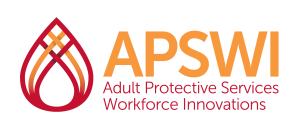APSWI eLearning
NOTE: There is a $50 per eLearning fee for participants outside of California.
Free eLearning
Course Description
This course will address reporting responsibilities; help participants to understand how, when and where to report suspected abuse or neglect; and inform participants of what to expect after the report has been made.
Course Registration Page
All APSWI eLearning
APS Case Documentation Report Writing
This interactive eLearning will enable participants to identify the purpose of accurate, complete, and timely documentation. (1 CE)
APS Overview
This eLearning is an orientation on Adult Protective Services (APS). Includes knowing who the client will most likely be; what circumstances compel intervention; and what interventions might look like. It will also provide you with important tools of the trade including common terminology and resources. (1 CE)
CA APS Standards for Consistency in Determining Findings
In this 90-minute eLearning course, participants will use the CA APS Standards for Consistency in Determining Findings Protocol, which consists of the Guiding Principles and the Matrix, and apply the protocol to case studies. This training will provide clarity on what information to gather during an investigation, what is and what is not important in evaluating the information, and guidance in interpreting the information. (1.5 CEs)
Caregiver or Perpetrator Neglect
This eLearning focuses on neglect that is perpetrated by formal and informal caregivers. It is designed to help participants develop the tools needed to conduct a neglect investigation and to develop plans to help to reduce the risk of future neglect. (1.5 CEs)
California Regulations for APS
This eLearning course was designed to help APS professionals understand California’s Adult Protective Services Regulations by requiring them to apply the regulations to abuse reports and case studies. (1 CE)
Case Closure
APS professionals will explore the natural dynamics that occur at case closure and the factors to consider in the decision-making process. Learn how to recognize common feelings experienced by the client and APS professional at the time of closure; their impact on the case closure process; and how to identify criteria and conditions that indicate appropriateness or inappropriateness of closing an APS case. (1.5 CEs)
Collaboration in APS Work
This eLearning will help APS professionals to define collaboration; explain why it is an effective method of working with other agencies; identify agencies APS can partner with; and list basic conflict resolution principles. (1 CE)
Deed Theft and Foreclosure Rescue Fraud
(Part of 6 mini modules on Financial Abuse)
This eLearning mini module will help identify and recognize Deed Theft and Foreclosure scams and identify partners in the field who can assist with the investigation when these types of scams occur.
Dynamics of Abusive Relationships
Adult Protective Services (APS) professionals and others will be taught how to define elder abuse; identify the various dynamics underlying elder abuse; why some victims refuse services and remain with their abusers; and explore how the dynamics might inform services offered by APS. (1.5 CEs)
Effectively Working with People Who Have Disabilities
In this eLearning, learners will explore disability in the past and present and talk about the disability movement in the United States. They will briefly cover three categories of disabilities commonly experienced by people engaged in Adult Protective Services. Finally, they will learn some examples of disabilities and how to effectively engage people with a wide range of abilities and disabilities. (1.5 CEs)
Elder Sexual Abuse
In this interactive eLearning participants learn about the myths and realities of sexual violence as it relates to APS clients. Participants learn how to recognize and discuss sexual victimization, how to screen for and interview clients regarding sexual abuse, and what interventions to offer victims. (1 CE)
Enhancing Your Investigative Skills: Interviewing Alleged Perpetrators
An important part of the APS investigation is your ability to interview alleged perpetrators. What you learn in the interview may affect your assessment of client risk, change your understanding of a situation, guide your determination about what services may be helpful, and ultimately, may impact your finding about the allegation. Whether you are an experienced and natural interviewer or someone just getting started with concerns about making a mistake, this 90 min online training will help you better prepare for the interview, thereby increasing your confidence and boosting your investigative and interviewing skills. (1.5 CEs)
Ethics, Values, and Cultural Responsiveness in APS
Adult Protective Services professionals confront a variety of ethical dilemmas in the course of their daily practice. In this course, learners explore the seven ethical principles of APS, and the dilemmas that can arise when two or more of these principles come into conflict. Learners will be introduced to the concepts of implicit bias, intersectionality, and cultural humility, and their impact on ethical decision-making. (1.5 CEs)
Financial Exploitation: An Introduction
This eLearning covers the demographics and indicators of financial abuse, decision-making capacity, and components of the investigation. It has been developed as a game, where participants can increase their score based on their answers. Learning occurs when feedback is given from the participant’s guesses. (1 CE)
Framework for Determining Dependent Adult Status
In this dynamic, interactive 90-minute online training, participants will utilize the Determining Dependent Adult Status Guide and Dependent Adult Definition Chart to work case studies. This training provides more clarity about what information to gather and guidance in interpreting it. The Framework presented will make the determination of dependency status easier and reduce the uncertainty associated with the process. (1.5 CEs)
Identity Theft and Credit Card Fraud
(Part of 6 mini modules on Financial Abuse)
This eLearning mini module will help you identify specific types of identity theft and credit card fraud, describe the elements of the crimes, identify the steps to take in an investigation, and identify partners in the field.
Initial Investigation Part 1: APS Intake Interview eLearning
This interactive eLearning teaches participants how to effectively determine whether a client meets APS criteria, to collect all material necessary to prepare for the interview, and to inform the APS worker of possible safety hazards. (1 CE)
Initial Investigation Part 2: APS Worker Safety eLearning
This interactive eLearning will guide you through some safety considerations for entering unfamiliar neighborhoods and client’s homes. (1 CE)
Interviewing Skills for APS Workers
This 3-part interactive eLearning will help APS professionals to engage with the client, conduct a clean forensic interview, and how to accommodate various sensory disabilities. (1.5 CEs upon completion of 3 parts)
Part 1: Learn about preparing for an interview.
Part 2: Interviewing 101 and special considerations.
Part 3: Learn about question typologies.
Involuntary Case Planning
This is a 3-part eLearning and focuses on skills that are important when approaching another agency, such as mental health or public guardian, to provide the intervention. (1.5 CEs upon completion of 3 parts)
Involuntary Case Planning for APS Workers Module 1: Learn how to identify involuntary interventions and when their use is appropriate.
Involuntary Case Planning for APS Workers Module 2: Focuses on ethical issues that arise when employing involuntary case plans.
Involuntary Case Planning for APS Workers Module 3: Look at all the information you need to collect and organize in order to make the case that an involuntary intervention is needed.
Living Trust and Annuities Scams
(Part of 6 mini modules on financial abuse)
This eLearning mini module will teach about living trusts and annuities, and how they may be used to victimize unsuspecting persons.
Mental Health Issues in APS Practice
This course is designed to provide APS professionals with an introduction to terms and behaviors used to identify mental health issues they may encounter when working with older adults. The course includes information on the five broad categories of mental disorders, diseases that affect the brain, and suicide risk assessment and intervention. Participants will have an opportunity to apply what they’ve learned to a series of case studies. (2 CEs)
Power of Attorney Abuses
(Part of 6 mini modules on Financial Abuse)
This eLearning mini module will provide information about the various types of Power of Attorney abuse and indicators that abuse may be taking place.
Responding to Physical Elder Abuse and Neglect
This interactive eLearning brings together forensic research, geriatric medical information tailored for elder physical abuse investigators, and practical field skills. Learn to differentiate between suspicious and non-suspicious situations and develop your strategies for investigating when physical abuse is suspected. (2 CEs)
Reverse Mortgage Abuse
(Part of 6 mini modules on Financial Abuse)
This eLearning mini module will define reverse mortgage abuse and identify the steps to take in investigating it.
Risk Assessment in APS
In this eLearning participants learn to assess the severity, urgency, and likelihood of harm occurring for a client across five domains. Learn the benefits and limitations of risk assessment tools; and how to develop risk-reduction service plans to help improve clients’ safety, security, and quality of life. (1.5 CEs)
Screening for Decision-Making Ability when Working with APS Clients
Assessing and determining whether clients have the ability to make informed decisions about their situations and care is one of the greatest challenges faced by APS professionals. This course will help you screen for your clients’ ability to make decisions by helping you tailor your interview questions to identify the factors that affect decision-making ability. It will also help provide an understanding of the uses and limitations of the tools available for screening decision-making ability, and the value and purpose of a formal capacity evaluation done by a clinical professional. (1.5 CEs)
SOC 242 and You: What You Need to Know
The SOC 242 is the data collection tool used by the California Department of Social Services (CDSS) to collect data about Adult Protective Services across the state of California. The SOC 242 was revised in 2019 to include more demographic information about the clients we serve, the suspected abusers, and who is making reports to APS. This course, The SOC and You: What You Need to Know, will increase your knowledge of the SOC 242, the purpose behind the report, and how to accurately report data so that informed decisions can be made at a state and federal level. (1.5 CEs)
Substance Abuse and Mature Populations
This eLearning course is designed for APS professionals and others who are unfamiliar with working with persons having substance use disorders or for workers who require a “refresher” in working with clients who have substance use disorders. (1 CE)
The Aging Process
This eLearning provides APS professionals and others with a basic understanding of the aging process that will enhance their ability to perform investigations and make evaluations. It includes a hands-on sensory awareness learning experience that participants will need to assemble prior to taking this course. (1.5 CEs)
Undue Influence
(Part of 6 mini modules on Financial Abuse)
This eLearning mini module explores undue influence, its relationship to financial abuse, indicators of undue influence, and information pertinent to investigating cases of alleged financial abuse where undue influence may be a factor.
Undue Influence Committed by Professionals
Investigating and uncovering the evidence needed to confirm financial abuse by undue influence is difficult. When that crime is committed by professionals (doctors, attorneys, ministers, accountants, to name but a few) it becomes even more daunting. This elearning course is an advanced course on this topic.
Voluntary Case Planning in APS
This interactive eLearning teaches participants the basic components of determining the intervention needs and developing a safety plan for elder abuse victims. (1 CE)
Working with Self-neglecting Clients
(1.5 CEs upon completion of 3 parts)
Part 1: Learn how to define self-neglect, it’s prevalence and indicators, and how to distinguish it from other conditions.
Part 2: Learn how to assess self-neglect in five domains.
Part 3: Focus on safety and risk reduction interventions, documentation, and working with community partners.
Working with the Criminal Justice System
This training will help APS professionals work more effectively with the Criminal Justice System by providing information that will promote a better understanding of and appreciation for the law enforcement and prosecution roles and perspectives. It explains how the Criminal Justice System operates, how to read and understand criminal statutes, and how to more effectively build cases by applying case facts to crime elements. (1.5 CEs)
Advanced eLearning
Client Decision-Making Capacity for APS & PG
This one-hour webinar will provide a comprehensive overview of the principles of the ASAM Criteria and how it is intended to be used within the Behavioral Health System of Care. Participants will be able to ask questions and obtain information on the basic structure of the ASAM Criteria. (1 CE)
Enhancing Your Investigative Skills: Interviewing Alleged Perpetrators
An important part of the APS investigation is your ability to interview alleged perpetrators. What you learn in the interview may affect your assessment of client risk, change your understanding of a situation, guide your determination about what services may be helpful, and ultimately, may impact your finding about the allegation. Whether you are an experienced and natural interviewer or someone just getting started with concerns about making a mistake, this 90 min online training will help you better prepare for the interview, thereby increasing your confidence and boosting your investigative and interviewing skills. (1.5 CEs)
Undue Influence Committed by Professionals
Investigating and uncovering the evidence needed to confirm financial abuse by undue influence is difficult. When that crime is committed by professionals (doctors, attorneys, ministers, accountants, to name but a few) it becomes even more daunting. This elearning course is an advanced course on this topic.
Advanced, California-Specific eLearning
CA APS Standards for Consistency in Determining Findings
In this 90-minute eLearning course, participants will use the CA APS Standards for Consistency in Determining Findings Protocol, which consists of the Guiding Principles and the Matrix, and apply the protocol to case studies. This training will provide clarity on what information to gather during an investigation, what is and what is not important in evaluating the information, and guidance in interpreting the information. (1.5 CEs)
Framework for Determining Dependent Adult Status
In this dynamic, interactive 90-minute online training, participants will utilize the Determining Dependent Adult Status Guide and Dependent Adult Definition Chart to work case studies. This training provides more clarity about what information to gather and guidance in interpreting it. The Framework presented will make the determination of dependency status easier and reduce the uncertainty associated with the process. (1.5 CEs)
SOC 242 and You: What You Need to Know
The SOC 242 is the data collection tool used by the California Department of Social Services (CDSS) to collect data about Adult Protective Services across the state of California. The SOC 242 was revised in 2019 to include more demographic information about the clients we serve, the suspected abusers, and who is making reports to APS. This course, The SOC and You: What You Need to Know, will increase your knowledge of the SOC 242, the purpose behind the report, and how to accurately report data so that informed decisions can be made at a state and federal level. (1.5 CEs)
Recommended Financial Abuse Training
Deed Theft and Foreclosure Rescue Fraud
This eLearning mini module will help identify and recognize Deed Theft and Foreclosure scams and identify partners in the field who can assist with the investigation when these types of scams occur.
Financial Exploitation: An Introduction
This eLearning covers the demographics and indicators of financial abuse, decision-making capacity, and components of the investigation. It has been developed as a game, where participants can increase their score based on their answers. Learning occurs when feedback is given from the participant’s guesses. (1 CE)
Identity Theft and Credit Card Fraud
This eLearning mini module will help you identify specific types of identity theft and credit card fraud, describe the elements of the crimes, identify the steps to take in an investigation, and identify partners in the field.
Living Trust and Annuities Scams
This eLearning mini module will teach about living trusts and annuities, and how they may be used to victimize unsuspecting persons.
Power of Attorney Abuses
This eLearning mini module will provide information about the various types of Power of Attorney abuse and indicators that abuse may be taking place.
Reverse Mortgage Abuse
This eLearning mini module will define reverse mortgage abuse and identify the steps to take in investigating it.
Undue Influence
This eLearning mini module explores undue influence, its relationship to financial abuse, indicators of undue influence, and information pertinent to investigating cases of alleged financial abuse where undue influence may be a factor.
Undue Influence Committed by Professionals
Investigating and uncovering the evidence needed to confirm financial abuse by undue influence is difficult. When that crime is committed by professionals (doctors, attorneys, ministers, accountants, to name but a few) it becomes even more daunting. This is an advanced topic eLearning. (1.5 CEs)




